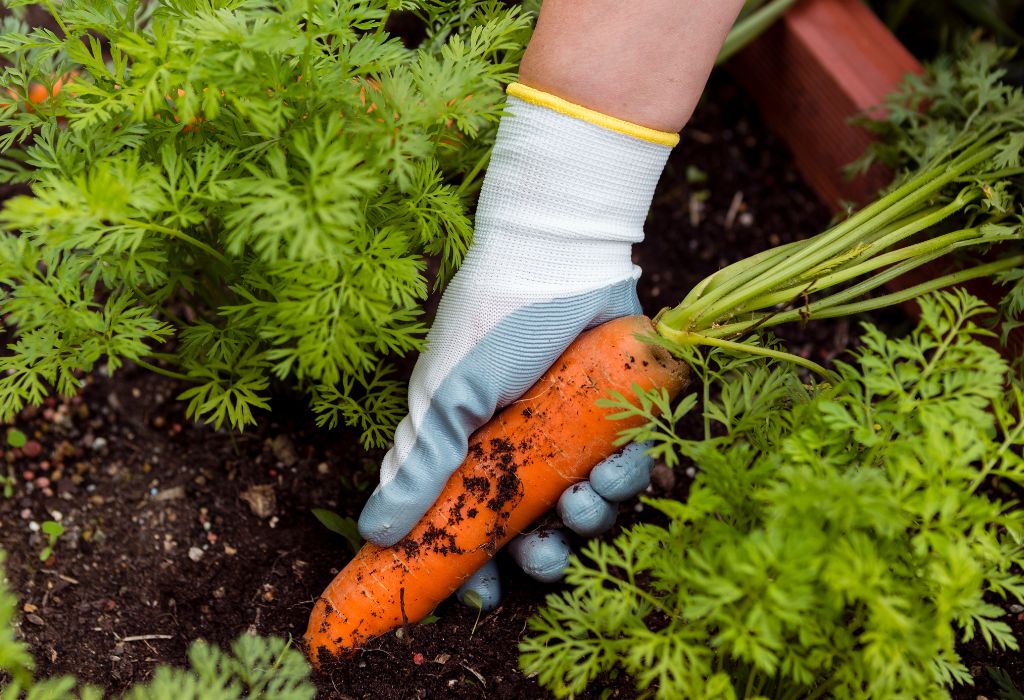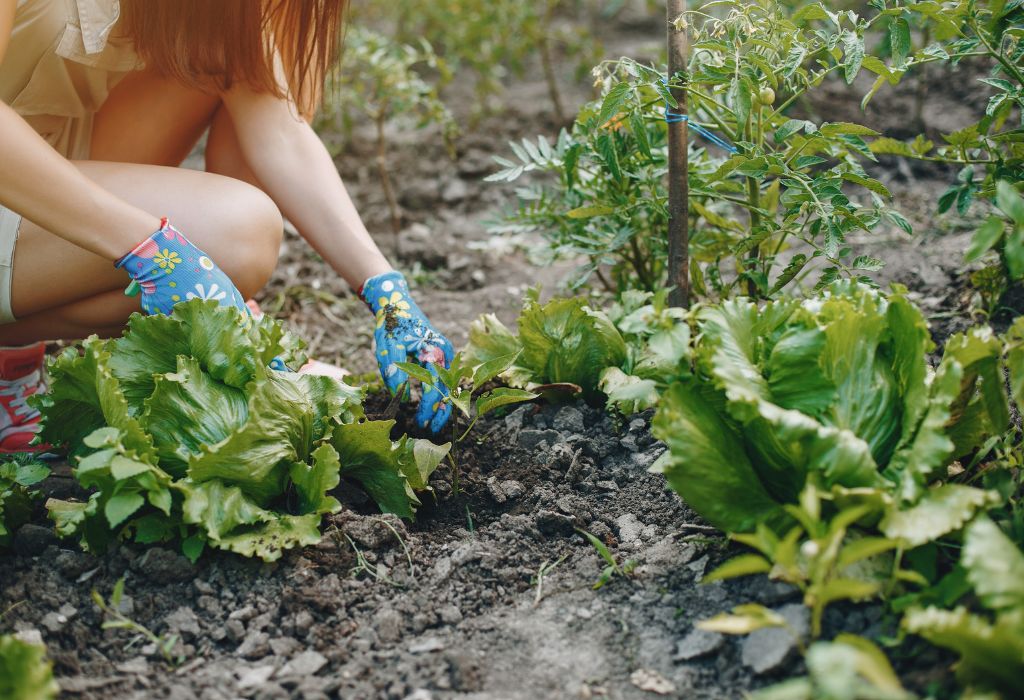Every gardener knows the frustration: you plant your vegetables, water them carefully, and then within days, weeds take over. Not only do weeds make your garden look messy, but they also compete with vegetables for nutrients, sunlight, and water.
Research shows that weeds can reduce vegetable yields by 30–50% if not controlled. Worse, the average home gardener spends over 120 hours each year weeding by hand. That’s valuable time that could be spent enjoying harvests instead of pulling unwanted plants.
The good news is you don’t have to fight weeds forever. With the right preventive strategies, you can drastically cut down weed growth and keep your vegetable garden healthy all season long.
I. Why Weeds Are Harmful in Vegetable Gardens

- Competition for Resources – Weeds absorb the same water and nutrients your vegetables need, leaving crops weak.
- Reduced Yields – Studies show that uncontrolled weeds can cut vegetable harvests nearly in half.
- Pest and Disease Hosts – Some weeds harbor insects and fungal diseases that spread to crops.
- Overshadowing Vegetables – Fast-growing weeds quickly shade slower-growing plants like carrots or lettuce.
- Soil Depletion – Deep-rooted weeds pull essential minerals away from your crops.
II. Why Do Weeds Keep Coming Back?
- Soil Seed Bank – Weed seeds can survive for 5–10 years in soil, sprouting when conditions are right.
- Seed Spread – Wind, pets, birds, and compost spread weed seeds across your garden.
- Frequent Tilling – While tilling can kill existing weeds, it also brings dormant seeds to the surface.
- Bare Soil Exposure – Leaving soil uncovered encourages rapid weed growth.
- Watering Mistakes – Overhead watering spreads weed growth across the soil surface.
III. Best Methods to Keep Weeds Out of Vegetable Gardens
1. Mulching for Vegetables
- Use organic mulches like straw, shredded leaves, or grass clippings to block sunlight.
- Apply mulch 2–3 inches deep to stop seeds from germinating.
- Refresh mulch mid-season for best results.
- Mulching reduces weed growth by up to 80% while improving soil moisture.
2. Cover Crops in Off-Seasons
- Sow rye, clover, or vetch in unused beds.
- Cover crops suppress weeds by 50%+ and add nitrogen to soil.
- Turn them into the soil as green manure for fertility.
3. Raised Beds & Containers
- Raised beds with clean soil are less prone to weeds.
- Containers provide near-complete weed control if filled with sterile soil.
- They make it easier to manage small-scale vegetable production.
4. Dense Planting & Companion Cropping
- Space vegetables closer together to shade soil.
- Companion crops like radishes with carrots or basil with tomatoes crowd out weeds.
- Dense planting reduces the chance of weed seeds germinating.
5. Smart Watering (Drip Irrigation)
- Drip irrigation targets plant roots without watering weed seeds.
- Reduces evaporation while keeping the soil surface drier.
- Long-term method that saves both time and water.
6. Hand Weeding & Hoeing at the Right Time
- Remove weeds while they’re still small—before they flower or set seed.
- Use a stirrup hoe or collinear hoe for quick weeding sessions.
- Just 10 minutes a week of early weeding can prevent hours of work later.
7. Soil Solarization Before Planting
- In summer, cover moist soil with clear plastic for 4–6 weeks.
- Sun heat kills weed seeds, pests, and soil diseases.
- Works best for preparing new beds.
IV. Eco-Friendly Alternatives to Chemical Control
- Corn Gluten Meal – A natural pre-emergent fertilizer that stops weed seeds from germinating.
- Vinegar Spray – Effective on small weeds in garden paths, but not selective (can harm crops).
- Flame Weeding – A propane torch burns weeds quickly, useful for pathways or edges, not crop beds.
V. Mistakes Gardeners Make
- Tilling Too Often – Brings dormant seeds to the surface.
- Mulching Too Thinly – Less than 2 inches is ineffective.
- Using Contaminated Compost – Introduces new weed seeds.
- Ignoring Weeds Until They Flower – A single pigweed can produce 250,000 seeds in a season.
VI. Seasonal Weed Management for Vegetable Gardens

- Spring – Apply mulch early, solarize soil, set up drip irrigation.
- Summer – Refresh mulch, hoe weekly, practice dense planting.
- Fall – Plant cover crops and remove leftover weeds.
- Winter – Clean beds, solarize soil if possible, plan rotations.
VII. Natural vs. Chemical Weed Solutions (Comparison Table)
| Method Type | Best For | Advantages | Disadvantages | Long-Term Effectiveness |
| Mulching | Vegetable beds | Improves soil, reduces weeds by 80% | Needs refreshing | High |
| Cover Crops | Off-season beds | Suppress 50%+ weeds, add nutrients | Seasonal planning required | Very High |
| Raised Beds | Small gardens | Easy soil control, low weeds | Higher setup cost | High |
| Dense Planting | Row crops | Shades soil, boosts yield | Needs careful spacing | High |
| Drip Irrigation | All vegetables | Saves water, reduces weeds | Setup required | High |
| Corn Gluten Meal | Pre-planting | Natural pre-emergent | Less effective on mature weeds | Medium |
| Chemical Herbicides | Large fields | Fast, low labor | Soil damage, weeds return | Low |
VIII. FAQs: Keeping Weeds Out of Vegetable Gardens
- What is the most effective way to prevent weeds in vegetable gardens?
Mulching with organic material is the simplest and most effective method. - Is mulch safe for vegetable beds?
Yes, straw, leaves, and compost are safe and beneficial. Avoid dyed mulch. - How often should I weed vegetables by hand?
Weekly quick weeding is enough if combined with mulching. - Can vinegar kill weeds around vegetables?
Yes, but use it only on walkways—vinegar harms crops too. - Do raised beds guarantee fewer weeds?
They drastically reduce weeds, especially if filled with fresh, clean soil.
IX. Key Statistics for Gardeners
- Weeds reduce vegetable yields by 30–50% if uncontrolled.
- Gardeners spend over 120 hours/year weeding.
- A single pigweed plant can release up to 250,000 seeds.
- Mulching cuts weed growth by up to 80%.
- Cover crops suppress weeds by 50%+ and improve soil fertility.
Conclusion
Keeping weeds out of your vegetable garden doesn’t have to be a losing battle. By focusing on prevention—through mulching, cover crops, raised beds, drip irrigation, and dense planting—you can dramatically reduce weeds while improving soil health.
Think of it this way: the less time you spend pulling weeds, the more time you can enjoy fresh, healthy harvests. With the right strategy, your vegetable garden can stay productive, beautiful, and almost weed-free all year long.
I’m Maya L. Greenwood, a lifelong plant lover who believes anyone can grow something beautiful with the right guidance. After years of testing soil mixes, pruning methods, irrigation tricks, and pest-safe solutions, I started EasyGardenTips.com to turn hard-won lessons into step-by-step advice. From seed starting and container gardens to composting and seasonal checklists, my goal is to make gardening simple, sustainable, and fun.
